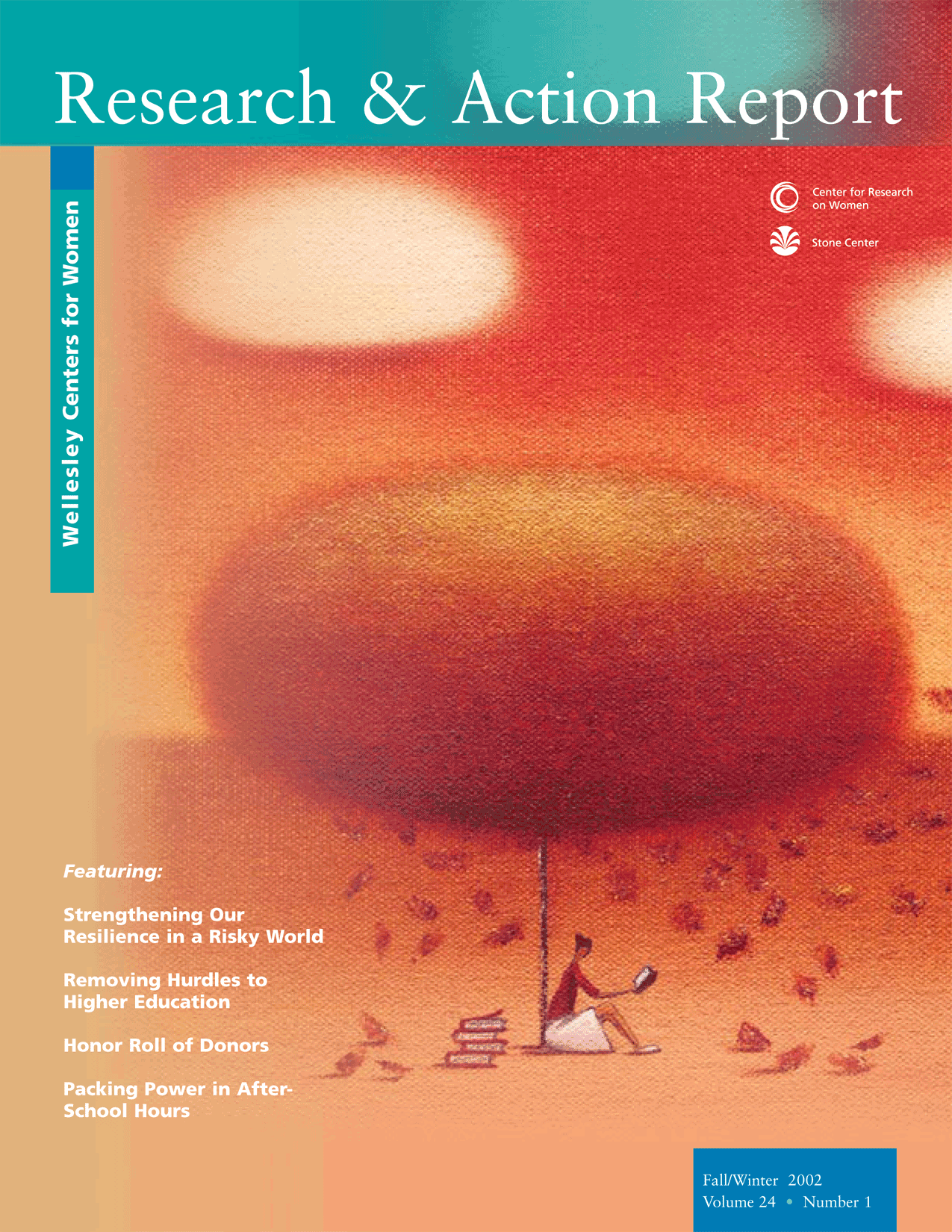Research and Action Report Fall/Winter 2002
On September 12, 2001, as the whole country was trying to make sense of the events of the previous day, parents and teachers had the even tougher task of helping young children deal with trauma. For participants of Open Circle, a social competency program of the Wellesley Centers for Women, the task was slightly easier.
"The success of Open Circle was never more evident than on September 12, when we sat and discussed the disaster," remarked a teacher who participates in Open Circle. "The children listened to the facts, dispelled rumors, asked honest questions, and shared feelings openly. As the weeks progressed, I really felt that they came to view the Open Circle as their safety net—a place where they could ask questions, express fears, be reassured, and then go on with school."
The Reach Out to Schools: Social Competency Program—also known to teachers and students as Open Circle—started as a pilot project at the Stone Center sixteen years ago with funding provided by Robert S. and Grace W. Stone to improve social skills of students at six Framingham, MA, schools. It is now a force that has trained over 4,500 teachers and over 200,000 children throughout New England and New Jersey, and is poised to grow nationally. The project continues to receive support from Pat and Barbara Roche, Roche Bros. Supermarkets, Inc., the DuBarry Foundation, the E. Franklin Robbins Trust, Seth A. and Beth S. Klarman, and a number of other generous individuals.
A recent study indicated that students who participate in Open Circle for two years or more in elementary school demonstrate better social skills, higher levels of adjustment, and lower levels of physical fighting in middle school than their peers who have little or no experience with the program. "In the Open Circle, kids are learning to value each person and each culture, and they are learning to be upfront in their exchange of information and respectful and caring in the way they treat other people," says Marsha Mirkin, a clinical psychologist in Newton, MA.
The formula for Open Circle is simple yet effective. Twice a week, children in the participating schools meet in their classrooms for 15 to 30 minutes. They come together in a circle that has one empty chair to signify that there is always room for another person—and another opinion. Led by a teacher who is trained in the Open Circle curriculum, they discuss seemingly simple issues, such as what listening is and how to express anger. "They learn social and emotional skills, so they can have conversations about things that are important to them and can handle real issues that come up, such as friendship problems or teasing on the playground," says Pamela Seigle, founder and executive director of Open Circle.
At the core of Open Circle is the curriculum kindergarten to grade five), which integrates research findings in child development with best teaching practices. It teaches the principles of communication, self-control, problem solving, responsibility, generosity, compassion, cooperation, respect, and assertiveness. The yearlong curriculum draws from research on risk and prevention and work in the area of emotional intelligence.
"Even the act of moving their chairs into an open circle teaches them many skills such as teamwork, cooperation, and problem solving," says Lisa Sankowski, associate director of Open Circle, "and parents are a vital part of the program since they become partners in the process." Open Circle stays in touch with parents through a newsletter that informs them of the skills and concepts that their children are learning in the classroom so that they can support the use of those skills at home.
Participating in Open Circle not only significantly reduces disciplinary and behavioral problems in the classroom, but it also empowers teachers to act as resources in supporting the social and emotional learning of their students. It increases teaching and learning time, reinforces leadership skills, assertiveness, interpersonal skills, and willingness to take positive risks. Most significantly, it strengthens the ability of students to form healthy relationships and to share responsibility for sustaining a positive climate in the classroom.
Studies show that the intellectual growth of young children does not happen in isolation but is closely linked to, and interwoven with, social and emotional growth. According to Sankowski, failure to address their complex social and emotional needs will undercut children's academic and social success and emotional well-being and may contribute to serious outcomes such as drug use and addiction, teenage pregnancy, mental health problems, delinquency, and violence.
Open Circle's most recent work focuses on the adult community through comprehensive training of teachers, school principals, and other staff. "We provide an opportunity for teachers and other adults in schools to reflect on their own beliefs, cultures, and assumptions and think about how these impact their relationships with their students and colleagues," says Seigle. Given the significant role that relationships play throughout our lives, it is clear that the contribution of Open Circle reaches far beyond elementary schools. "We see our program as a foundation for learning lifelong skills, not just skills for elementary classrooms," says Seigle. "These skills will help children develop the capacity to have positive relationships in their lives and be good learners and good friends."
For more information on Open Circle, visit www.wellesley.edu/OpenCircle.


